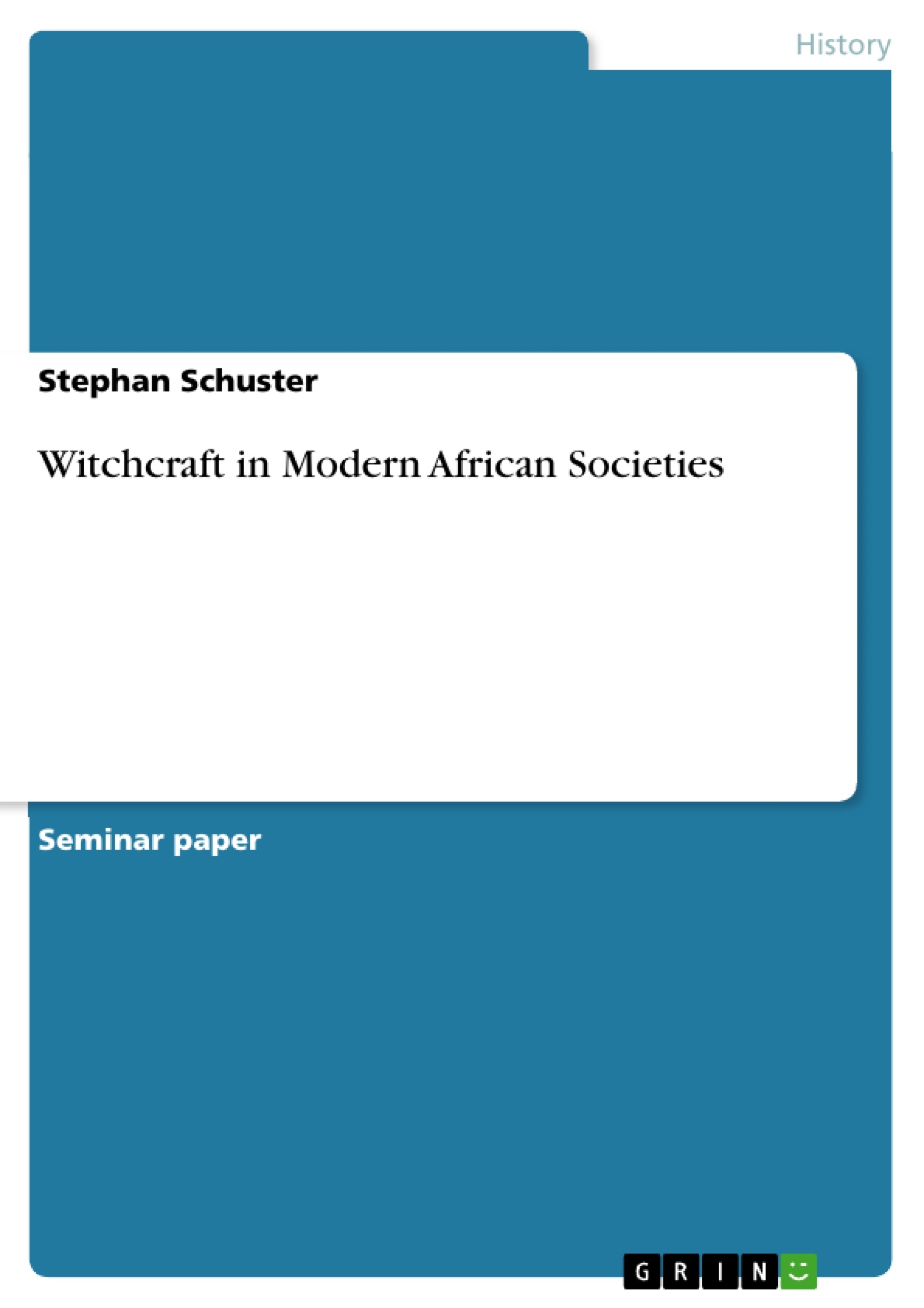Eine Auseinandersetzung mit dem Problem der Hexerei in modernen Afrikanischen Gesellschaften, auch in Bezug auf die Immunschwäche AIDS.
Table of Contents
- Introduction
- Witchcraft Definition
- Witchcraft Violence
- The State Reacts
- The Problem of AIDS
- Conclusions
Objectives and Key Themes
This paper aims to examine the evolution of witchcraft violence in modern African societies, particularly in South Africa, and to identify factors contributing to its persistence. It seeks to understand the challenges faced by a modern democracy in addressing this enduring problem. The paper avoids debating the reality of witchcraft, focusing instead on its existence as a social phenomenon and its impact.
- The evolution of witchcraft beliefs and practices in modern Africa.
- The role of witchcraft accusations in social conflict and violence.
- The legal and political responses to witchcraft-related issues.
- The connection between witchcraft beliefs and other social problems, such as poverty and AIDS.
- The challenges of addressing witchcraft beliefs within a modern democratic framework.
Chapter Summaries
Introduction: This introductory chapter establishes the context of the study by highlighting the historical trajectory of scholarship on witchcraft in Africa. It emphasizes a shift from earlier anthropological perspectives that often exoticized African belief systems to more recent approaches that treat African societies with greater respect and understanding. The chapter underscores the paper's focus on the social reality of witchcraft beliefs, irrespective of their ontological truth, and outlines the structure of the subsequent analysis, promising to address witchcraft definitions, violence, state responses, and the AIDS problem in relation to witchcraft.
Witchcraft Definition: This chapter delves into the nuances of the term "witchcraft" in African contexts. It contrasts the gender-specific nature of the English term "witch" with the gender-neutral equivalents in many African languages. The chapter explains that witchcraft in Africa generally refers to the use of magical means to inflict harm, encompassing actions ranging from property damage to causing disease and death. The role of ancestral beliefs and the potential for forgetting one's ancestors as a consequence of witchcraft are also explored, illustrated by the example of Adam Ashforth's friend Madumo. The chapter also discusses the profiles of those accused of witchcraft (often middle-aged women), the motivations behind witchcraft accusations (hatred and envy), and the use of medicines and muti (herbal remedies). It clarifies the current understanding of witchcraft, noting that while there were once distinctions between witchcraft and sorcery, these terms are now often used synonymously.
Witchcraft Violence: [To be completed with information from the provided text if available. This section requires significantly more text to create a 75-word summary.]
The State Reacts: [To be completed with information from the provided text if available. This section requires significantly more text to create a 75-word summary.]
The Problem of AIDS: [To be completed with information from the provided text if available. This section requires significantly more text to create a 75-word summary.]
Keywords
Witchcraft, Africa, South Africa, violence, belief systems, ancestral spirits, muti, social conflict, political response, AIDS, modern democracy.
Frequently Asked Questions: A Comprehensive Language Preview
What is the topic of this paper?
This paper examines the evolution of witchcraft violence in modern African societies, particularly in South Africa, and analyzes the factors contributing to its persistence. It focuses on the social phenomenon of witchcraft and its impact, rather than debating its ontological reality.
What are the key themes explored in the paper?
The paper explores the evolution of witchcraft beliefs and practices in modern Africa; the role of witchcraft accusations in social conflict and violence; the legal and political responses to witchcraft-related issues; the connection between witchcraft beliefs and other social problems like poverty and AIDS; and the challenges of addressing witchcraft beliefs within a modern democratic framework.
What does the paper say about the definition of witchcraft in African contexts?
The paper discusses the nuances of the term "witchcraft," contrasting the gendered English term "witch" with gender-neutral equivalents in many African languages. It explains that witchcraft in Africa generally refers to using magic to inflict harm, ranging from property damage to causing death. The role of ancestral beliefs and the potential for forgetting one's ancestors are explored, along with profiles of those accused (often middle-aged women), motivations (hatred and envy), and the use of muti (herbal remedies). The paper notes that while distinctions between witchcraft and sorcery once existed, they are often used synonymously now.
How does the paper approach the study of witchcraft in Africa?
The paper adopts a contemporary approach, moving away from older anthropological perspectives that sometimes exoticized African belief systems. It focuses on understanding African societies with respect and emphasizes the social reality of witchcraft beliefs, regardless of their ontological truth.
What is the structure of the paper?
The paper is structured into chapters covering an introduction, a definition of witchcraft, an analysis of witchcraft violence, a look at state responses, an examination of the problem of AIDS in relation to witchcraft, and concluding remarks. Each chapter delves into specific aspects of the issue, building a comprehensive understanding of witchcraft's role in modern African society.
What are the keywords associated with this paper?
The keywords include: Witchcraft, Africa, South Africa, violence, belief systems, ancestral spirits, muti, social conflict, political response, AIDS, modern democracy.
What are the objectives of this research?
The main objective is to examine the evolution of witchcraft violence in modern African societies, focusing on South Africa, and to identify contributing factors to its persistence. It seeks to understand the challenges faced by a modern democracy in addressing this enduring problem.
- Quote paper
- Stephan Schuster (Author), 2004, Witchcraft in Modern African Societies, Munich, GRIN Verlag, https://www.grin.com/document/186458



